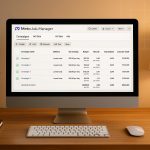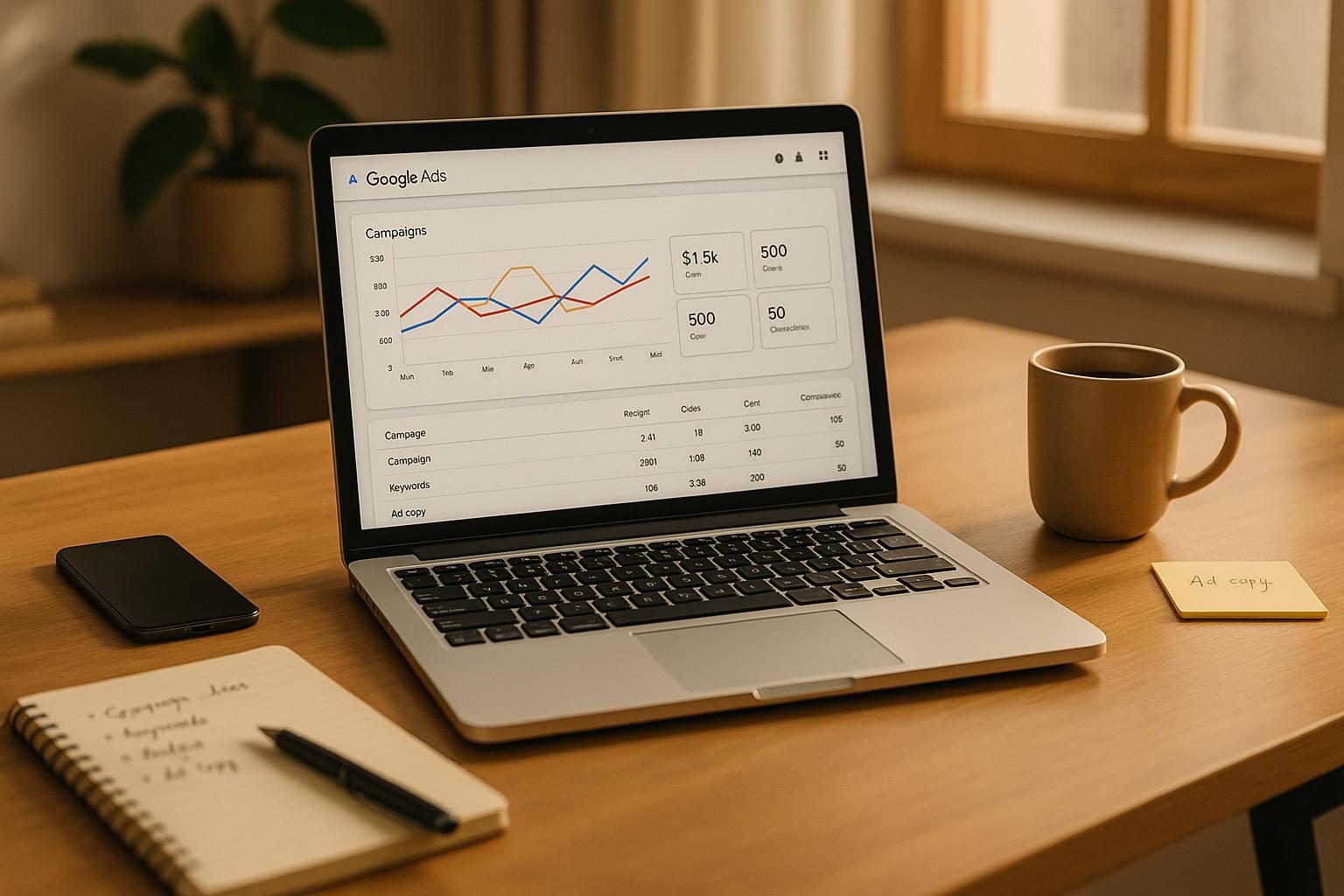

Google Ads can help small businesses in South Africa compete with larger companies by reaching the right customers at the right time. With pay-per-click (PPC), you only pay when someone clicks on your ad, making it cost-effective. Here’s a quick guide to getting started:
- Define your goals: Be specific, like increasing online sales by R15,000 in 90 days or getting 20 leads per week.
- Know your audience: Target customers by location, language, and income level. Use localised keywords like "affordable plumber Cape Town" or "braai equipment Johannesburg."
- Choose the right campaign type:
- Search ads for immediate conversions.
- Display ads for brand awareness.
- Shopping ads for online product sales.
- Local ads to drive foot traffic.
- Video ads for storytelling.
- Set a budget: Start small, like R50–R100 daily, and adjust based on performance.
- Use effective bidding strategies: Beginners can start with "Maximise Conversions" and later try "Target CPA" for better control.
- Write clear, localised ad copy: Use simple language, include a strong call-to-action (e.g., "Call Now"), and consider multiple languages like Afrikaans or isiZulu.
How to Run Google Ads on a Small Budget (EXACT Settings for Success)
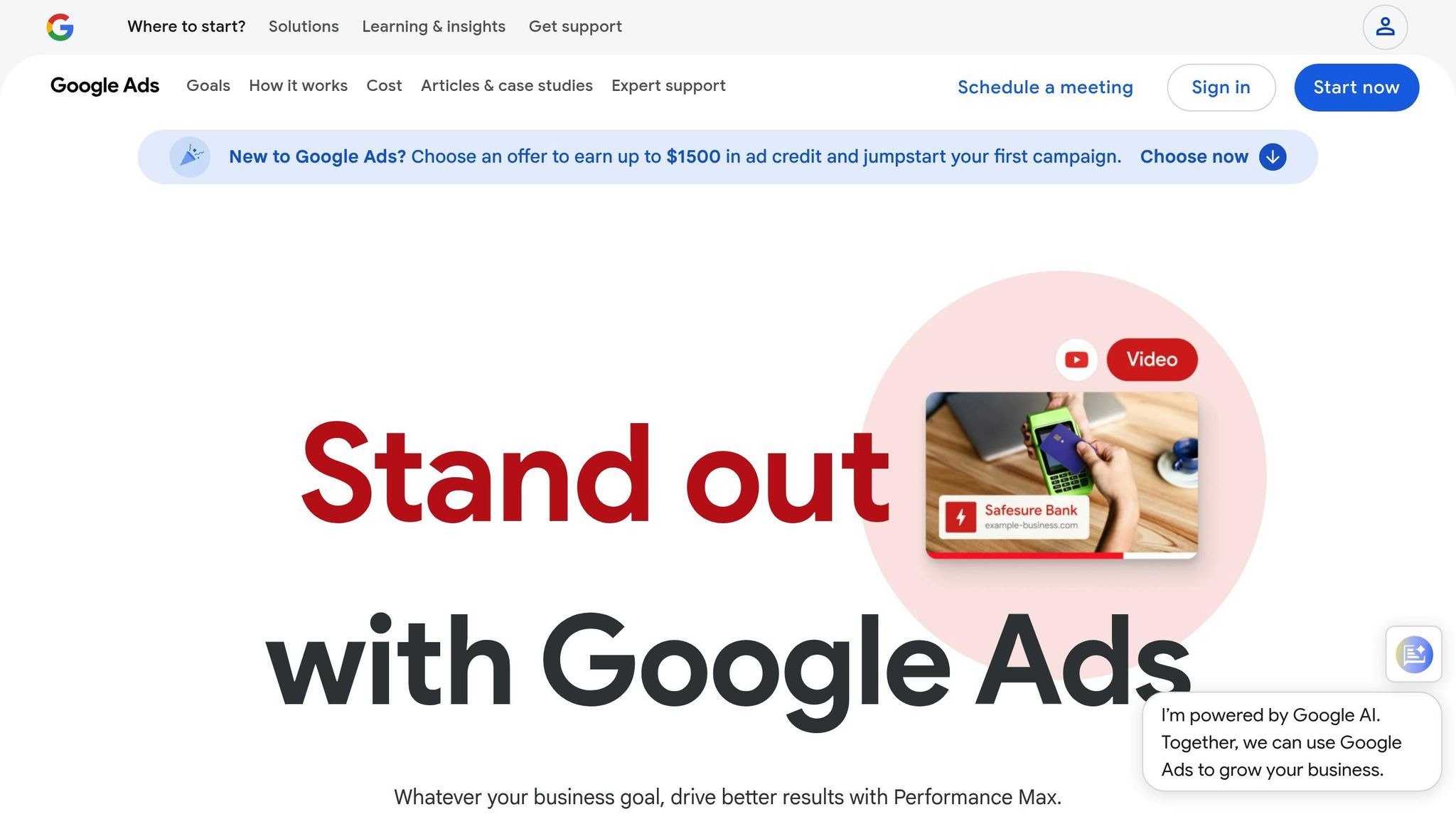

Set Your Business Goals and Know Your Audience
Before diving into a Google Ads campaign, it’s crucial to define what success looks like and understand who you’re targeting. Without these two key elements, even the most polished campaigns can end up wasting your marketing rand.
Set Clear Campaign Goals
Start with a goal that’s specific and measurable, not something vague like "get more customers." For example, you might aim to increase website traffic by a certain percentage, generate qualified leads at a set cost, or boost online sales within a defined period.
Let’s say you run a restaurant in Cape Town. A clear goal could be to increase online table bookings by 40% over the next three months. Or, if you’re a Durban-based plumber, you might aim to secure 20 new enquiries per week. These are the kinds of goals that give your campaign a clear purpose.
Make sure your campaign type matches your objective. For instance:
- Use awareness campaigns to drive traffic.
- Opt for conversion-focused campaigns to generate leads.
- Choose search or shopping ads for sales.
Stick to SMART goals – Specific, Measurable, Achievable, Relevant, and Time-bound. Instead of saying, "increase sales", say, "increase online sales by R15,000 per month within 90 days." This approach not only sharpens your focus but also helps with budget allocation and performance tracking.
Also, consider your business’s seasonal cycles. For instance, a Johannesburg air conditioning business might see higher demand during summer (October to March), while a Pretoria tax consultancy might focus on the lead-up to tax season (January to July). Timing your campaigns around these cycles can maximise results.
Once your goals are in place, it’s time to zero in on the customers who can help you achieve them.
Find Your Target Customer
With your objectives set, the next step is to define your ideal customer. South Africa’s diverse market means you’ll need to consider factors like demographics, location, and cultural preferences.
Think about where your customers live, their preferred languages, and their income levels. For example, a luxury car dealership in Sandton will target a very different audience compared to a budget grocery store in Soweto.
Geographic targeting is especially important in South Africa because of the economic differences across regions. A product priced at R500 might sell well in affluent areas like Constantia or Ballito but struggle in lower-income areas. Google Ads’ location targeting lets you focus your budget on areas where your potential customers live and shop.
Language is another key factor. While English is widely used, some audiences may search in Afrikaans, isiZulu, or other local languages. For instance, a traditional healer in KwaZulu-Natal might benefit from isiZulu keywords, while an Afrikaans bakery in the Western Cape could see better results with Afrikaans search terms.
Income levels also play a big role in shaping search behaviour. High-income consumers often search for "premium" or "luxury" options, while budget-conscious shoppers look for terms like "affordable" or "cheap." A financial services company targeting middle-class families in Bloemfontein would craft a very different campaign than one targeting wealthy individuals in Camps Bay.
Don’t forget mobile optimisation. Many South Africans access the internet primarily through their phones, particularly in townships and rural areas. Make sure your ads and landing pages are mobile-friendly and mindful of data costs.
Timing matters, too. For example, B2B services often perform better during working hours (08:00-17:00), while restaurants and entertainment venues see the most activity in the evenings and on weekends. Align your campaigns with local routines and South Africa Standard Time (SAST, UTC+2) for better results.
Lastly, build customer personas to guide your strategy. For instance, you might create a persona like this: Sarah, 35, from Centurion, earns R40,000/month, uses her phone during lunch breaks, and values convenience and quality. This kind of detailed profile can shape everything from your keyword choices to your ad copy and bidding strategy.
Choose the Right Google Ads Campaign Type
Selecting the right campaign type is key to achieving your marketing goals. Google Ads offers a variety of options, each designed to suit different objectives and customer behaviours. Picking the right one can make a big difference in your return on investment (ROI).
Campaign Types Explained
Your goals will guide you in choosing the most suitable Google Ads campaign type.
Search campaigns are the backbone of Google Ads. These text-based ads appear when users search for products or services like yours. They’re positioned prominently at the top of Google search results, targeting high-intent customers. On average, Search campaigns deliver a conversion rate of 4.4% across all industries, with costs in South Africa typically ranging from R20 to R30 per click.
Display campaigns feature visual banner ads across Google’s network of partner websites. While their conversion rate is lower – around 0.57% – they’re excellent for increasing brand visibility and reaching users who may not be actively searching for your product or service. In South Africa, Display ads generally cost less than R20 per click.
Shopping campaigns are perfect for businesses selling physical products online. These ads showcase product images, prices, and your business name directly in search results, giving potential customers a preview before they click. They’re particularly effective for e-commerce businesses by offering a visual shopping experience.
Video campaigns are hosted on YouTube and Google’s video partner sites. These ads are ideal for storytelling or showcasing products in action. For example, a fitness studio in Cape Town could use video ads to highlight workout classes and attract new members.
Local campaigns are designed for businesses with physical locations. These ads help drive foot traffic by promoting your business across Google Search, Maps, YouTube, and the Display Network.
Performance Max campaigns are Google’s latest addition, using machine learning to automatically place ads across all Google properties for maximum reach and efficiency.
The key is to choose a campaign type that aligns with your business goals and where your customers are in their buying journey.
Pick the Best Campaign for Your Business
Your campaign type should reflect how your customers behave and their stage in the buying process.
If you need immediate conversions, Search campaigns are your best bet. They’re particularly effective for businesses that rely on direct responses.
For businesses looking to build awareness, Display campaigns are a great starting point. For instance, a new restaurant in Stellenbosch could use Display ads to introduce itself to local food lovers browsing recipes or restaurant reviews, making use of the lower cost per click.
If you sell products online, Shopping campaigns are a must. A Durban surf shop, for example, could use these ads to display surfboards and wetsuits directly in search results, driving more qualified traffic to their website.
If your business depends on physical foot traffic, Local campaigns are ideal. A Pretoria hair salon could use these ads to share their location, contact details, and even special offers across Google’s platforms.
For businesses that benefit from visual storytelling, Video campaigns are a powerful tool. A Port Elizabeth wedding photographer, for example, could run video ads showcasing their portfolio to connect with potential clients on an emotional level.
Small businesses often start with Search campaigns to capture immediate customer intent. Once they see consistent results, they can branch out into Display or Video campaigns to reach broader audiences and build brand recognition. Budget is another factor to consider – Google Ads typically delivers an average 8:1 ROI, so even smaller budgets can be impactful when used strategically. For example, a Bloemfontein accounting firm with a R5,000 monthly budget might achieve better results by focusing on Search campaigns during tax season.
After choosing your campaign type, the next step is researching the right keywords to connect effectively with your South African audience.
Research Keywords for South African Audiences
Once you’ve chosen the right campaign type, the next step is to dive into keyword research tailored to South African audiences. This step is crucial because effective keyword research connects your business with potential customers precisely when they’re searching for your products or services. By understanding local search habits, language preferences, and regional variations, you can optimise your campaigns and avoid wasting your ad spend.
South African search trends often stand apart from global patterns due to unique local contexts, specific terminology, and economic factors. Instead of relying on generic phrases, focus on terms that reflect local nuances in your industry. These subtle differences can significantly impact your campaign’s success.
Now, let’s explore how to uncover these keywords using the right tools.
How to Use Google Keyword Planner
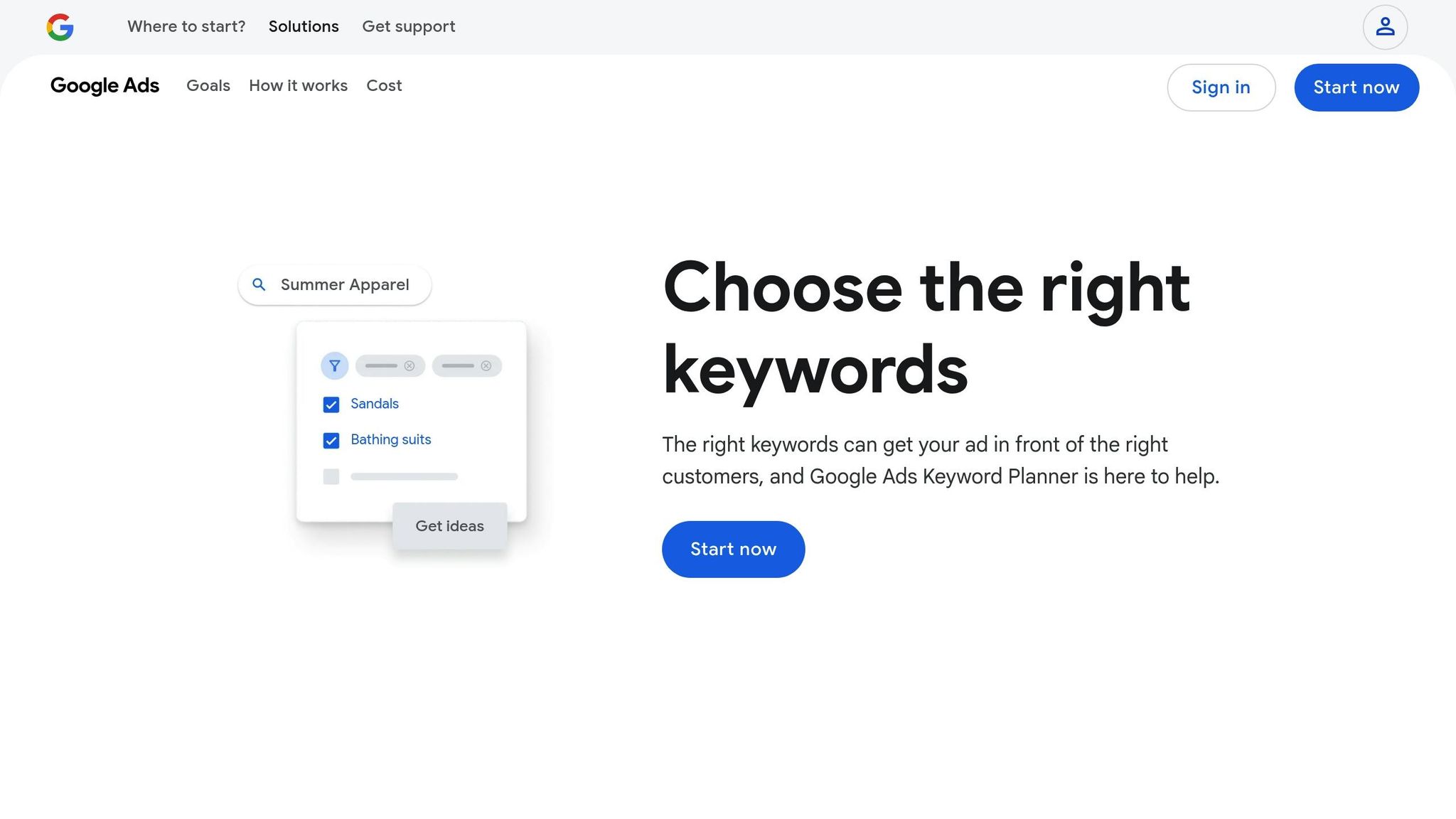

Google Keyword Planner is a powerful tool for identifying keywords that resonate with South African audiences. It provides search volume data, competition levels, and bid estimates specific to South Africa, helping you make smarter decisions about which keywords to target.
To get started, access Keyword Planner through your Google Ads account and set your target location to South Africa. This step is essential because search behaviour and competition can vary widely across regions.
Begin by entering seed keywords from a South African perspective. For instance, if you’re a plumber in Cape Town, avoid generic terms like "plumber." Instead, use more specific terms like "plumber Cape Town" or "emergency plumber Western Cape." The tool will generate a list of related keywords, complete with monthly search volumes and competition levels.
Pay close attention to the average monthly searches column. Keywords with search volumes between 1,000 and 10,000 are often ideal for small businesses. They strike a balance between generating traffic and avoiding the intense competition of high-volume terms.
Review the competition levels and top-of-page bid estimates to plan your budget effectively. While "Low" competition keywords can offer affordable opportunities for good ad placements, don’t shy away from "High" competition terms if they are highly relevant to your business. Sometimes, these can deliver excellent results despite the higher costs.
The keyword ideas feature is another goldmine. It reveals how South Africans search for businesses like yours, often uncovering local slang, alternative spellings, or specific product names that might not appear in global research.
Choose Keywords for Local Audiences
Selecting the right keywords for South African audiences requires a deep understanding of local search habits. Your strategy should reflect how South Africans search and make decisions.
Geographic targeting is especially important for small businesses. Incorporate city names, provinces, or well-known areas into your keywords. For instance, an accounting firm in Johannesburg could use terms like "tax consultant Sandton" or "bookkeeper Randburg." These geo-specific keywords often have less competition and higher conversion rates because they attract users with clear local intent.
Local terminology can also make a big difference. South African English includes unique phrases that global keyword research might overlook. For example, a car dealership should target "second-hand cars" instead of "used cars", and estate agents might focus on "flats to rent" rather than "apartments for rent." These small distinctions can influence both search volume and user intent.
Seasonal trends play a significant role in keyword performance. For example, searches for "matric results" spike in January, while "tax returns" peak between July and October. Aligning your keywords with these predictable patterns can help you get the most out of your ad spend.
Price-conscious keywords often resonate with South African consumers. Terms like "affordable", "budget", or "special offers" can attract cost-sensitive shoppers. However, it’s worth balancing these with keywords that highlight quality, appealing to those who prioritise value over price.
Mobile-first keywords are increasingly important, as many South Africans use mobile devices to access the internet. Short, location-based queries tend to perform well in mobile searches.
Don’t forget about language variations. Even within English searches, South Africans may mix Afrikaans terms or use regional slang. For example, a braai equipment supplier might target both "braai equipment" and "BBQ equipment" to cover different preferences.
Long-tail keywords are another valuable option for small businesses. Phrases like "best family restaurant Stellenbosch" may not have massive search volumes, but they often deliver better conversion rates and lower costs per click.
Finally, experiment with match types – exact, phrase, and broad. Exact match gives you precise control but limits your reach, while broad match increases visibility but may bring in irrelevant traffic. Phrase match strikes a good balance, capturing variations while keeping relevance intact.
sbb-itb-6f8605a
Set Your Budget and Bidding Strategy
After identifying your targeted keywords, the next step is to define a budget that aligns with South Africa’s market conditions and your financial objectives. This part of your Google Ads campaign is crucial – it’s about balancing spending with results. Your budget sets the financial limits, while your bidding strategy determines how aggressively you compete for clicks. Together, they shape how effectively your campaign performs in the local market.
Plan Your Budget in South African Rand (R)
Start by reviewing your finances to decide on an ad spend that feels manageable. For small businesses in South Africa, it’s important to base your monthly budget on factors like your industry, competition, and overall business goals.
First, calculate how much acquiring a new customer is worth to your business. For instance, if you run a plumbing service and an average job earns you R2,500, you can afford to spend more per click compared to a business with lower-value transactions. To estimate your daily budget, use this formula: target cost per click (CPC) x expected daily clicks. For example, if your target CPC is R15 and you expect 30 clicks a day, your daily budget would be about R450 – or roughly R13,500 per month.
If this feels too high, start small with a daily spend of R50–R100. Testing with a modest budget helps you understand the market response and avoid costly mistakes early on. As you gather data and refine your strategy, you can gradually increase your budget.
It’s also important to allocate your budget wisely across campaigns. For example, if you’re running both search and display campaigns, consider dedicating around 70% of your budget to search campaigns. These typically yield better conversion rates, as they target users actively searching for your services.
Monitor your impression share during the initial stages. If your most profitable campaigns are losing impressions due to budget limits, it may be time to increase spending. On the other hand, if you’re not using your full daily budget, check whether your bids are too low or if your targeting needs adjustment.
Adjust your budget based on seasonal trends and regional competition. For example, allocate more funds to high-demand areas like Johannesburg and Cape Town, while reducing spend in quieter regions.
Select a Bidding Strategy
Once your budget is set, the next step is choosing a bidding strategy that aligns with your goals and uses your data effectively. Google Ads offers several automated bidding options that use machine learning to optimise bids – especially helpful for businesses without dedicated advertising expertise.
- Target CPA (Cost Per Acquisition): Ideal for controlling costs while focusing on conversions. For example, if acquiring a new customer is worth R500, setting a target CPA of R200 can help maintain a healthy profit margin. This strategy works best if you’ve achieved around 30 conversions in the past month.
- Maximise Conversions: A straightforward option for generating as many conversions as possible within your daily budget. This strategy is great for beginners, as it doesn’t require setting a specific cost per acquisition – Google dynamically adjusts bids based on performance data.
- Enhanced CPC (Cost Per Click): A hybrid approach where you set maximum bids, but Google can increase bids – by up to 30% – for clicks that are more likely to convert. This offers a balance between manual control and automation.
For new advertisers, Maximise Conversions is often a good starting point due to its simplicity and effectiveness. After 4–6 weeks of data collection and achieving consistent conversions, you might consider switching to Target CPA for more predictable costs.
Google’s Smart Bidding strategies, like Target CPA and Target ROAS (Return on Ad Spend), use real-time data to optimise your bids. These strategies need time to learn and adapt, so let them run for at least two weeks before making significant changes.
Lastly, don’t overlook bid adjustments to fine-tune your campaign. For example, if you notice that mobile users convert better, you might increase bids for mobile traffic. Or, if you see lower activity during certain hours, reduce bids during those times. These small tweaks, combined with your chosen bidding strategy, can significantly improve your return on investment.
Create Ads and Track Performance
With your budget and bidding strategy sorted, the next step is to create ads that resonate with South African audiences and deliver tangible results. Effective ads are the bridge between your business and potential customers, so it’s worth getting them just right.
Write Good Ad Copy
Once your spending plan is in place, shift your focus to crafting ad content that speaks directly to your audience. For South African consumers, this means understanding local preferences and cultural subtleties. Use simple, clear language that avoids unnecessary complexity, ensuring your message is accessible to everyone.
Start strong with your headlines – they’re the first thing people notice. Headlines should highlight your product or service while including a clear call-to-action (CTA). Make use of all three headline slots to pack in essential information. For example: "Emergency Plumber Cape Town | 24/7 Service | Call Now." This approach informs users quickly and encourages immediate action.
Your ad descriptions should back up your headlines by emphasising key points like unique selling features, promotions, or standout services. Be concise but make sure you’re informative. Highlight what makes your business special – whether it’s free quotes, same-day service, or decades of experience. For instance: "Trusted by Cape Town families for 15 years. Free quotes, same-day repairs, and all work guaranteed. Licensed plumbers available 24/7."
Quality ads aren’t just about words – they’re about connection. Ads that reflect South African culture and use local terminology or references (like landmarks) are more likely to grab attention and boost engagement. A higher engagement rate can also improve your Quality Score, which means better ad placement and cost efficiency.
South Africa’s linguistic diversity is another factor to consider. To reach a broader audience, create ads in multiple languages such as Zulu, Xhosa, Afrikaans, and English. For areas with a significant Afrikaans-speaking population, running a parallel campaign in Afrikaans could help you connect with even more customers. This multilingual strategy aligns with the tailored approach discussed in your targeting and keyword research.
Finally, always include a clear and direct CTA like "Call Now" or "Book Online Today" to encourage immediate action. Once your ads are live, keep a close eye on key performance metrics. Regular monitoring will help you refine your strategy and get the most out of your ad spend.
Tools and Support from Aion Marketing
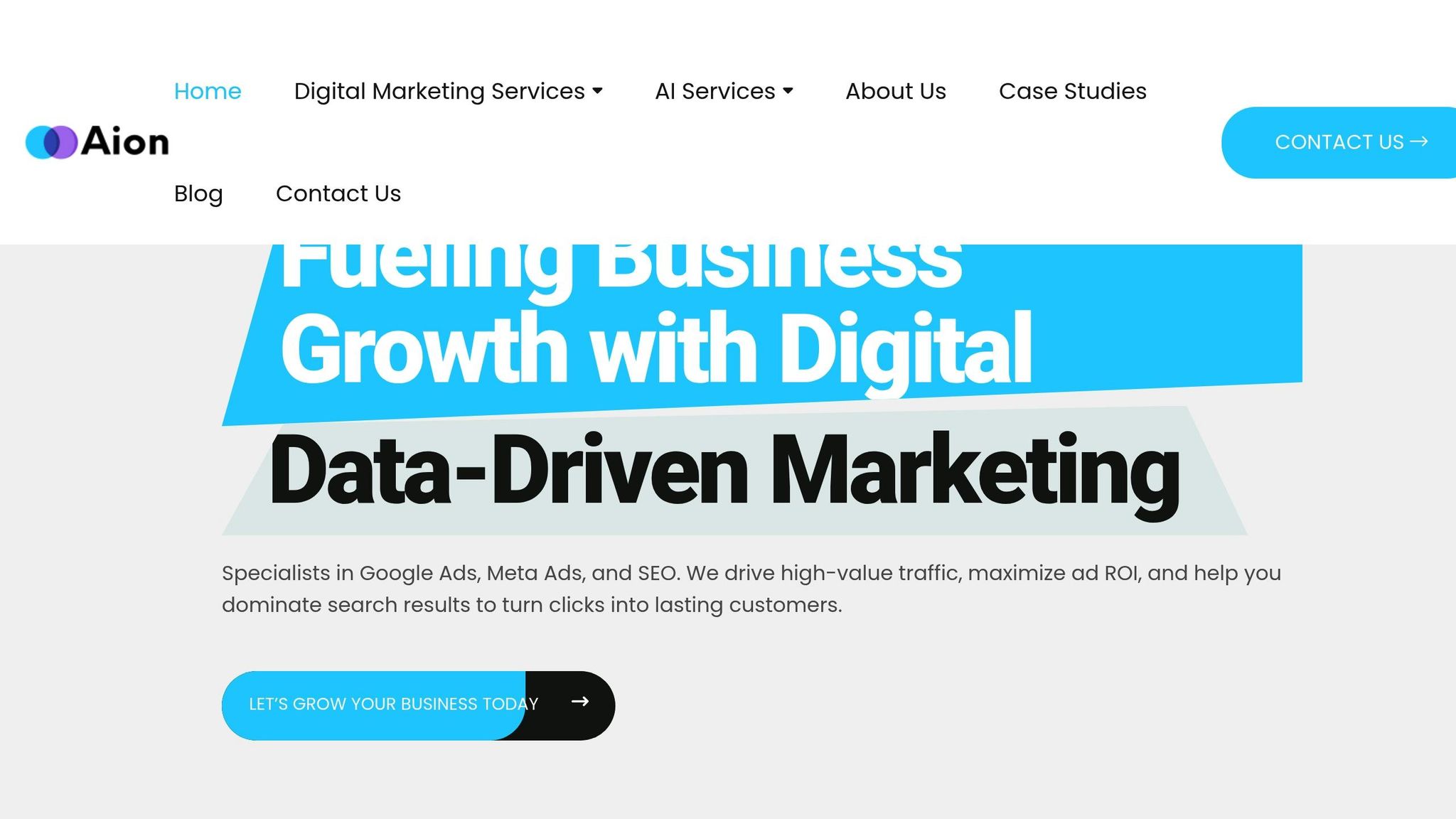

Managing Google Ads can feel overwhelming, especially for small business owners. That’s where partnering with experts can turn your advertising into a powerful tool for growth. Aion Marketing offers services that simplify the setup, fine-tuning, and tracking of your campaigns, so you can focus on running your business.
How Aion Marketing Can Help
Aion Marketing specialises in Google Ads management tailored for South African small and medium-sized enterprises (SMEs). Their team handles every aspect of your campaign – from setup to ongoing optimisation and conversion tracking. By taking on technical tasks like keyword research and campaign monitoring, they ensure your ads connect with the right audience across South Africa.
The real magic happens in campaign optimisation. Aion Marketing doesn’t just set up your ads and leave them; they continuously refine your campaigns. This includes tweaking keywords, testing new ad copy, and reallocating budgets based on live performance data. If certain keywords aren’t delivering, they’ll adjust. If a new ad copy performs better, they’ll focus on that. It’s all about making your campaigns work harder for you.
Beyond managing campaigns, they also implement conversion tracking. Whether it’s phone calls, form submissions, or sales, Aion Marketing ensures you’re measuring the metrics that truly matter to your business.
Benefits of Working with Aion Marketing
Aion Marketing’s expertise delivers clear, measurable benefits that go beyond basic campaign management. Their data-driven approach provides detailed insights into key metrics like click-through rates (CTR), conversion rates, cost per lead (CPL), and return on ad spend (ROAS). These metrics help you gauge the profitability of your campaigns with confidence.
With real-time performance tracking, you can quickly identify underperforming ads and refine your targeting or messaging as needed. Their expert guidance helps you make the most of your ad spend, driving more leads and better results.
Aion Marketing also focuses on building long-term partnerships. As your business grows, they continuously adapt your advertising strategy to meet changing needs. Their deep understanding of the South African market, including its unique economic and social dynamics, ensures your campaigns resonate with your target audience in meaningful ways. This local insight can be a game-changer in achieving your advertising goals.
Conclusion: Key Steps for Small Business Success
Setting up Google Ads for your small business doesn’t have to be overwhelming if you approach it with a clear plan. Start by defining your goals – whether it’s driving more website traffic, increasing phone inquiries, or boosting online sales. These goals will guide every step, from choosing the right campaign type to crafting ad copy that resonates with your South African audience.
With your goals in place, you can focus on localised keyword research. Tools like Google Keyword Planner can help you identify the terms your customers are searching for. Combine this with a smart budget strategy in rand, showing that even a modest R500 monthly spend can deliver meaningful results.
Choosing the right campaign type is another critical step. Search campaigns are great for capturing immediate intent, while Display campaigns are better suited for building brand awareness across South Africa. It’s often best to focus on mastering one campaign type before branching out into others.
Once your campaign is live, ongoing optimisation is essential. This is where you separate effective campaigns from wasted spend. Track your conversions, identify which keywords are driving real business outcomes, and tweak your bidding strategies based on actual performance data. Remember, what works in Cape Town might not work as well in Johannesburg, so adjust accordingly.
Finally, while technical tasks like setting up conversion tracking and managing bids are crucial, they can also be time-consuming and complex. For small business owners who may not have the time or expertise to handle these details, working with specialists like Aion Marketing can make all the difference. Their deep understanding of the South African market, paired with their technical know-how, ensures your campaigns are in capable hands.
FAQs
How do I set an effective Google Ads budget for my small business in South Africa?
To plan a workable Google Ads budget for your small business in South Africa, start by evaluating your marketing objectives and the size of your target market. For many small businesses, a monthly budget of ZAR 5 000 to ZAR 10 000 is a practical starting point. This amount allows you to experiment with campaigns and gather useful performance insights.
It’s essential to match your budget to your anticipated return on investment (ROI). Tools like Google Keyword Planner can help you estimate keyword costs, giving you a clearer picture of potential expenses. As your campaigns run, monitor your spending and results closely, making adjustments to ensure you’re using your budget wisely.
What are the different types of Google Ads campaigns, and how do I choose the best one for my business goals?
Google Ads provides a variety of campaign types, each tailored to specific advertising goals and formats. Here’s a quick breakdown:
- Search campaigns: These use text-based ads to connect with people actively searching for your products or services.
- Display campaigns: These rely on eye-catching visual ads placed across websites, perfect for increasing brand visibility.
- Shopping campaigns: Designed for e-commerce, they showcase individual products directly in search results.
- Video campaigns: These run video ads on YouTube, offering a dynamic way to engage your audience.
- App campaigns: Ideal for promoting mobile apps, these campaigns focus on driving app downloads and engagement.
- Performance Max: This option combines multiple ad formats into a single, AI-driven campaign for broader reach.
- Smart campaigns: A streamlined, automated solution, particularly useful for small businesses or those new to Google Ads.
Choosing the right campaign depends on your goals. Want to boost sales or generate leads? Search or Shopping campaigns might be your best bet. Looking to build awareness? Go for Display or Video campaigns. If you’re after an all-in-one approach, Performance Max is a solid choice. And if you’re new to Google Ads, Smart campaigns offer a simple, hands-off option. Match your campaign type to your objectives and budget to get the most out of your advertising efforts.
Why is localised keyword research important for Google Ads in South Africa, and how can I optimise it?
Local keyword research plays a key role in crafting successful Google Ads campaigns in South Africa. It allows you to pinpoint the exact terms your audience searches for, aligning your ads with local trends, language nuances, and preferences.
To make the most of this, tools like Google Keyword Planner can be incredibly helpful in identifying keywords that suit your business and target audience. Prioritise phrases that reflect local language variations, include South African currency (Rands), and cater to regional interests. By weaving these insights into your campaigns, you’ll not only boost your ad performance but also create a stronger connection with your South African audience.






